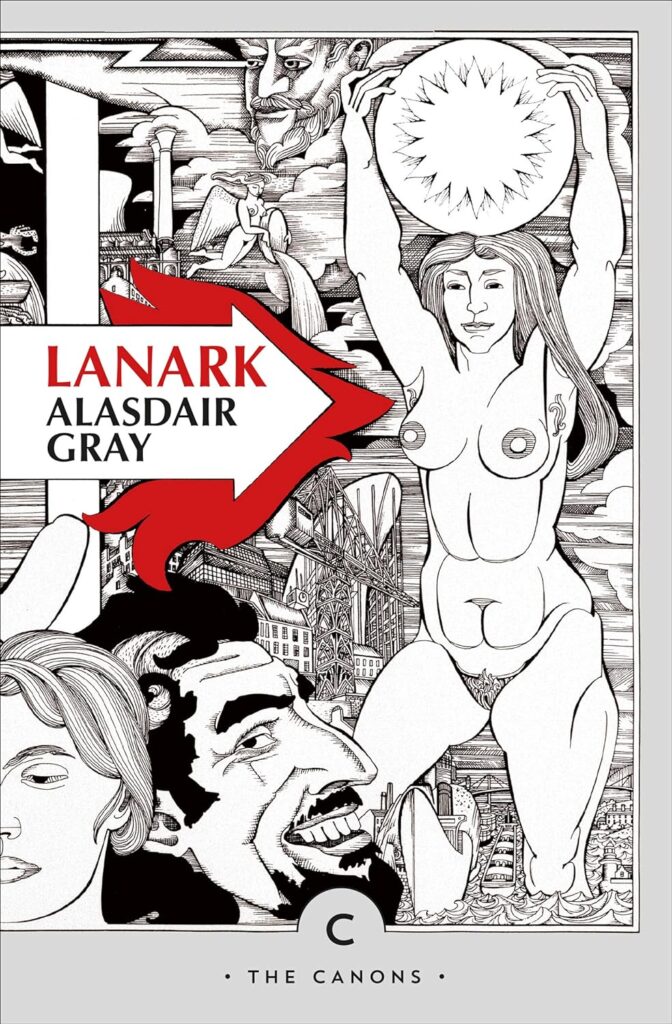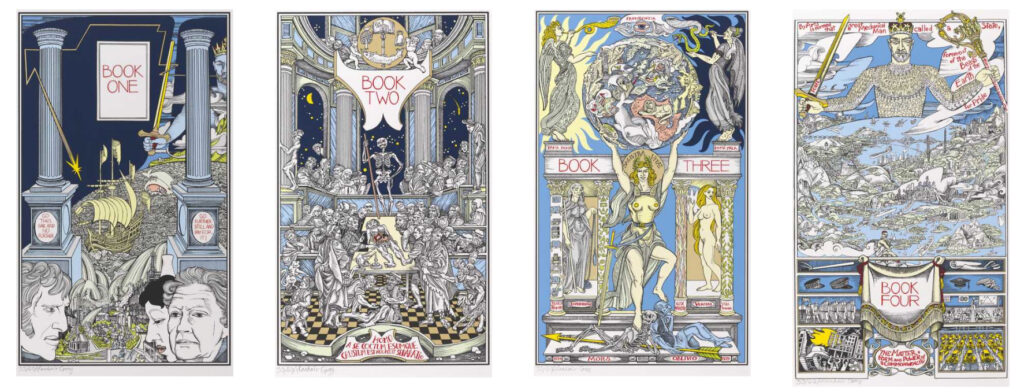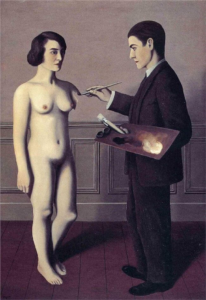 |
Lanark: A Life in Four Books Alasdair Gray B002VM7FWQ |
又读了一本格雷的书,又是一本大五星!这本是一本比较大部头的又有一点自传性质的小说,这么描述这本小说实在太辜负它了,因为它真的太丰富了,形式上、内容上、叙事上都不是一本普通的小说。
好看的感觉是从一开始就有的,读每一章都好像在看一本新的书。一开始的时候感觉好像传说中的《尤利西斯》,又好像是在读《魔山》或是某本科幻小说。我感觉如果我可以survive这本书、我也可以去挑战《尤利西斯了》。
这本小说的编排也很特别,一共分为四个部分,分别是Book3,Book 1,Book 2和Book 4。Book 3和4是围绕着同一个主人公Lanark的故事,Book 1和2是Lanark偶遇的人讲的故事,主人公是Duncan Thaw(所谓的自传的性质是作者更贴近)。尾章不在最后,因为尾章后面还有Book 4的最后四章。
如果说Thaw的故事还是老老实实的比较传统的小说,只不过主人公是比较边缘又典型的艺术家人格并且很能带动读者的情绪,我读Book 2的那几天感觉也和主人公一样,有一种漫无目的地游荡好像每一步都可以是最后一步的放手感。Book 3就是一开头的让读者尝尽各种天马行空的情节变幻,读一本书就等于读了好几本书的新鲜感,所以深深被这本书给吸引住了。Book 4直接是魔幻两个字,Lanark在迷雾中前行,听到各种声音、见到循环的路径和在不同地方出现的同一东西,地图指示牌又好像在指示跳转的章节。主人公们迅速长大、生娃、老去等等,超越时空的世界,回归的却是很政治的主题。抢在故事结束之前出现的尾章又可以立地封神,因为Lanark在那里和这本小说的神也就是这本小说的作者直接对话。破次元的玛格丽特式的对话,怎么能让我不喜欢。
一如格雷其他的作品,这本小说中也充斥着性别话题、政治话题,就算在这本书出版40年后的的现在看起来还是很前沿也很适用的一些观点和分析。比如第36章直接可以读作一篇政治寓言。Lanark的故事会不会是在讲人类的世界,因为资本主义带来了人性本恶贪婪的恶果。自由竞争、改变命运,其实成了slippery slope。最突出的中国人自己特别爱卷,国家试图改变内卷,从学生开始,却改变不了卷后的成人世界。另,Thaw的故事里面的Coulter怎么一上班没多久就那么精准地认识到了上班之恶。

找书的封面图片的时候,在Tate的网站上还看到有四本书的作者自己画的封面,很好看。不知道是不是真的在Tate里面可以看到,下次留意一下。
一些摘抄
Think which you would rather own: fifty thousand pounds or a piece of land valued at fifty thousand pounds. The only people likely to prefer the land are financiers who know how to increase its value by renting or reselling, so either answer proves that money is preferable to things.
My memory was a catalogue of things I had ignored and devalued. I had enjoyed no definite friendship or love, no intense hatred or desire; my life had been stony soil in which only numbers grew, and now I could do nothing but sift the stones and hope one or two would turn out to be jewels. I was the loneliest and most impotent man in the world. I was about to turn desperate when a lovely thing appeared in the air before me.
Only the miracle of my genius stops me feeling depressed about this.
Many hard workers make nothing but wealth. They don’t produce food, fuel, shelter or helpful ideas; their work is just a way of tightening their grip on folk who do.
What I hate most is their conceit. Their institute breaks whole populations into winners and losers and calls itself culture. Their council destroys every way of life which doesn’t bring them a profit and calls itself government. They pretend culture and government are supremely independent powers when they are nothing but gloves on the hands of Volstat and Quantum, Cortexin and Algolagnics. And they really think they are the foundation. They believe their greed holds up the continents. They don’t call it greed, of course, they call it profit, or (among themselves, where they don’t need to fool anyone) killings. They’re sure that only their profit allows people to make and eat things.
As the creature couldn’t stay rich by selling necessary things to the folk who made them it sold destructive things to the council. Then the war started and the destructive things were used to wreck the necessary things. The creature profited by replacing both. (The council) split in two and fought itself. The efficient half eats the less efficient half and grows stronger. War is just a violent way of doing what half the people do calmly in peacetime: using the other half for food, heat, machinery and sexual pleasure. Man is the pie that bakes and eats himself, and the recipe is separation.
